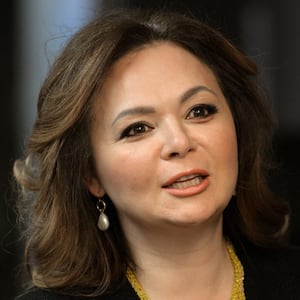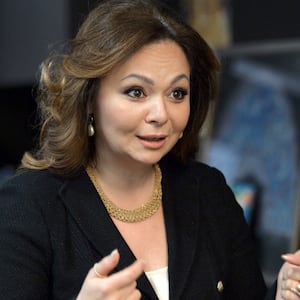The Russian lawyer who attended the notorious Trump Tower meeting with senior Trump campaign officials in 2016 has been indicted on an obstruction of justice charge for lying about her collusion with Russian officials, federal prosecutors announced Tuesday.
The indictment claims Natalia Veselnitskaya was working closely in secret with Russian officials while covering-up her back-channel in U.S. court.
While representing Russian real-estate conglomerate Prevezon in a federal money-laundering case involving corrupt Russian officials, Veselnitskaya intentionally misled the feds by presenting supposedly independent evidence from the Russian prosecutors office about her clients without disclosing that she had participated in drafting that information with the help of “a senior Russian prosecutor,” the U.S. government alleges.
The grand-jury charge claims to show that U.S. officials have accessed communications between Veselnitskaya and her government colleagues back in Moscow—which will be of great interest to Mueller watchers who have pondered the Kremlin’s involvement in Veslenitskaya’s notorious trip to Trump Tower in June 2016.
Her name first surfaced in a July 2017 New York Times report, which revealed that Donald Trump Jr. received an email stating “a "Russian government attorney" had damaging intel on Hillary Clinton. The mysterious missive also claimed that the dirt came from "Russia and its government's support for Mr. Trump."
The Trump team originally dismissed suggestions that Veselnitskaya’s subsequent summit with Don Jr., Paul Manafort and Jared Kushner was evidence of collusion with the Russian government.
Veselnitskaya insisted that she met the Trump team in a private capacity, and was not directed by Russian officials. The charge sheet made public on Tuesday makes clear that she was in close contact with senior Russian officials. Veselnitskaya was so deeply trusted by the Kremlin that she was allowed to draft and edit Russia’s official response to a U.S. judicial request.
One of the main targets of Veselnitskya’s operation—named in the indictment as CEO-1—was Bill Browder, a U.S.-born hedge fund manager who once operated out of Russia. She and Putin both claim that Browder had carried out the fraud Prevezon was accused of laundering.
The Southern District’s indictment suggests that Veselnitskaya is central to Russia’s persecution of Browder, a task that is very close to Putin’s heart. The hostility dates back to 2009 when Browder’s lawyer, Sergei Magnitsky, died in Russian custody.
Tuesday’s indictment even caught Browder by surprise. “This shows that every aspect of the Russians dirty operation—which is not just limited to Prevezon but much more broadly—is coming out. This is the definition of karma,” he told The Daily Beast. “At the end of this process there will be no secrets.”
The revelation that Veselnitskya was allowed to craft official documents in the name of the prosecutor general’s office as part of her role in lobbying against Browder exposes the true nature of Russia’s judicial system.
“The Russians just came up with new charges against me and another Interpol notice, this indictment just means that all their bogus charges are going to be ignored by everybody,” Browder said. “It also shows what a totally haphazard operation the Russians really run.”
Veselnitskaya began representing Prevezon in 2015, when former Manhattan U.S. Attorney Preet Bharara pursued a $230 million money-laundering case against the company.
The company ultimately settled with the Manhattan U.S. Attorney’s Office for $5.9 million in 2017 and after some wrangling over how to pay, Prevezon agreed in 2018 that it would fork over the money, Bloomberg reported.
As a lawyer for Prevezon, Veselnitskaya allegedly filed “an intentionally misleading declaration” to fight prosecutors allegations of financial wrongdoings. This declaration detailed “supposed investigative findings by the Russian government—findings purportedly exonerating Veselnitskaya’s clients—under the false pretense that these findings had been independently drafted by the Russian government.”
In reality, Veselnitskaya hid the fact “as a member of the defense team in the Prevezon action,” she “had participated in drafting those supposed exculpatory investigative findings in secret cooperation with a senior Russian prosecutor,” prosecutors said.
When Veslnitskaya got involved in the Prevezon case, prosecutors were trying to recover millions in property, largely in New York, on the basis this real estate was used in laundering money from a “Russian tax fraud scheme,” also referred to as the “Russian Treasury Fraud.”
This fraud, prosecutors alleged, was a massive scheme in which a “criminal organization”—that included corrupt Russian government officials—cheated the country’s taxpayers. The alleged fraudsters stole the “corporate identities” of three businesses that were owned by a foreign investment fund, made up bogus debts against these stolen businesses, and then claimed tax refund “on the basis of those false corporate liabilities,” prosecutors said.
Magnitsky had uncovered this fraud. He was subsequently arrested, imprisoned without trial, and left without treatment to die after a beating.
U.S. prosecutors in March 2014 asked the Russian government for records related to the fraud, including bank documents that would detail the flow of dirty money, under the Mutual Legal Assistance Treaty (MLAT).
That August, Russian officials answered the MLAT request but sent U.S. prosecutors a government report from the Prosecutor General’s office rather than the documents.
This Russian MLAT Response contained “ supposed investigative findings purportedly from a Russian government investigation” which claimed to clear all Russian government officials of involvement in this fraud,” U.S. prosecutors said.
Prevezon in November 2015 tried to dissuade a judge from determining that fraud had taken place, also claiming that Russian government officials weren’t involved in any alleged wrongdoing.
Veselnitskaya’s declaration, which included the MLAT response, not only claimed it was “exculpatory evidence” bolstering Prevezon’s claims of innocence—she also said she had “ gone to great lengths to obtain a copy of it.”
The Russian lawyer maintained not only that she tried getting a copy from Russia’s Prosecutor General and had been denied—but that she pursued an action in a Russian court to compel Russian prosecutors’ cooperation.
The Manhattan U.S. Attorney’s Office charges that Veselnitskaya’s claim of Russian prosecutors’ resistance is untrue.
Emails from an account Veselnitskaya used show that she “secretly worked with a senior Russian prosecutor to help draft the Russian MLAT Response.” She sent “multiple drafts” of her declaration to the personal email address of a Russian prosecutor in the Prosecutor General’s Office. The Russian prosecutor made numerous edits and insertions to the Russian MLAT Response, U.S. prosecutors charge.
This same Russian prosecutor also sent Veselnetskaya a draft complaint against the Prosecutor General to show her purported efforts in obtaining MLAT info.
“Such a formal complaint would falsely make it appear—consistent with the Veselnitskaya Declaration—that Veselnitskaya was only able to obtain the Russian MLAT Response through formal legal means and was not a party to its very drafting,” U.S. prosecutors claim.
In Veselnetskaya’s court filing, she didn’t disclose any information about the Russian prosecutors’ involvement, not that she helped pen the MLAT response.
Veselnitskaya, 43, has not been detained by U.S. authorities and is believed to be in Russia.
Putin’s personal animosity to Browder is intense; he even singled him out for criticism during the historic joint press conference with President Trump after the Helsinki summit.
Browder took up his cause and pledged to track down the stolen money wherever in the world it had been hidden and hold the perpetrators of the fraud, death, and cover-up to account.
In 2012, President Obama signed the Magnitsky act into law in the U.S. sanctioning senior Russian officials for their roles in the crime. The Magnitsky act has since been expanded in the U.S. and beyond to go after corrupt Russian officials and oligarchs including some of Putin’s closest associates.
Lawyers for Prevezon did not immediately respond to requests for comment.









